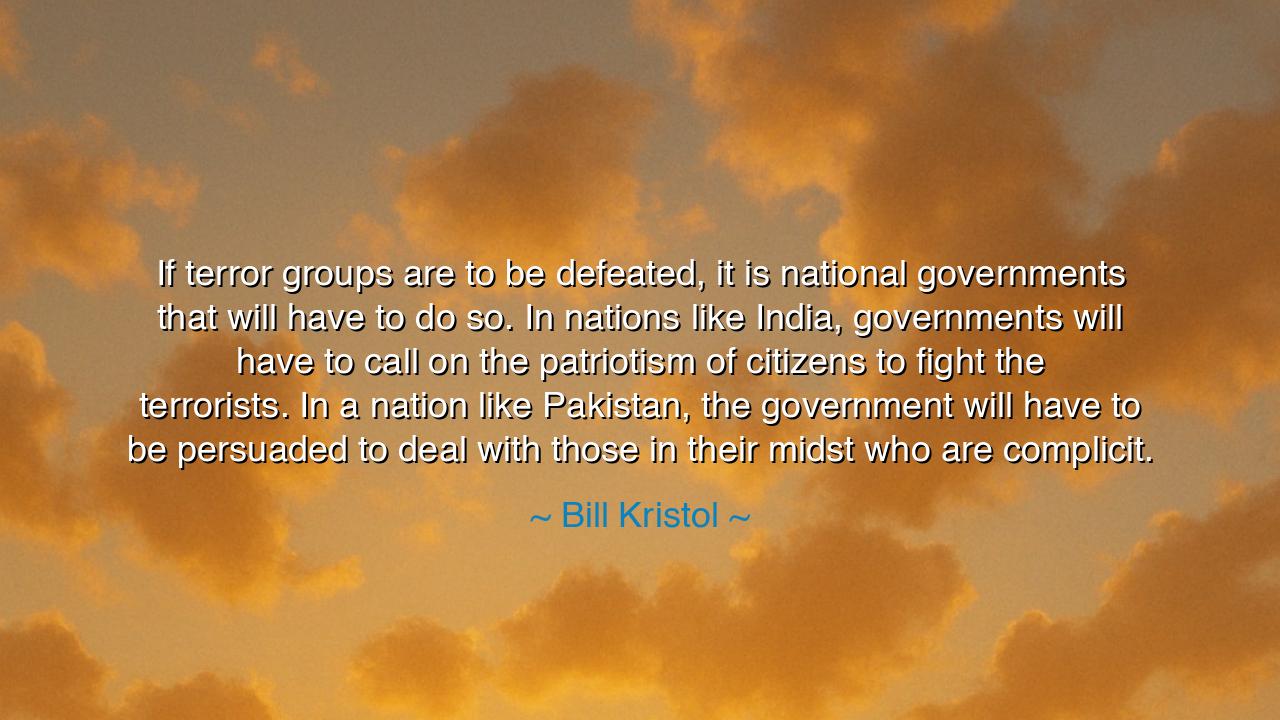
If terror groups are to be defeated, it is national governments
If terror groups are to be defeated, it is national governments that will have to do so. In nations like India, governments will have to call on the patriotism of citizens to fight the terrorists. In a nation like Pakistan, the government will have to be persuaded to deal with those in their midst who are complicit.






The words of Bill Kristol—“If terror groups are to be defeated, it is national governments that will have to do so. In nations like India, governments will have to call on the patriotism of citizens to fight the terrorists. In a nation like Pakistan, the government will have to be persuaded to deal with those in their midst who are complicit.”—ring like the utterance of a prophet surveying the storms of our age. In them we hear a recognition both of the danger posed by terror groups, and of the sacred responsibility borne by governments and citizens alike. For evil festers not merely in hidden camps or shadowed caves, but in the hesitation of rulers and the silence of the people.
Kristol teaches that the burden of victory lies first upon national governments. Armies may be raised, weapons forged, alliances sworn, but without the will of governments to act with courage and clarity, terror will not be subdued. A ruler who looks away from injustice, or a state that harbors those who strike at innocents, becomes itself a silent accomplice. Just as a shepherd who ignores wolves condemns his flock, so a government that refuses to confront terror condemns its own people to fear and ruin.
And yet governments cannot stand alone. In nations like India, Kristol reminds us, victory requires the fire of patriotism burning in the hearts of the people. When terror seeks to sow fear, it is the citizens who must refuse to bow. In 2008, when Mumbai was struck by coordinated attacks, ordinary men and women became heroes. Taxi drivers ferried the wounded to safety, doctors worked tirelessly in overflowing hospitals, and countless citizens gave blood to save strangers. Here we see the truth of Kristol’s words: the state provides arms and law, but the people themselves, through courage and solidarity, provide the spirit that refuses to be broken.
But in nations like Pakistan, where terror has at times been sheltered, the challenge is greater. The call is not only to resist enemies at the gate, but to confront those within. Here Kristol names a deeper duty: governments must be persuaded to sever ties with the complicit, to uproot the poisons that grow within their borders. This task is more arduous, for it requires leaders to turn against factions that once served their interests, and to renounce short-term gain for long-term justice. Yet history shows that nations which harbor the seed of violence within their own soil reap bitter harvests, for no fire remains contained forever.
The example of post-9/11 America also sheds light upon this teaching. The government called upon its people for vigilance, resilience, and unity. Citizens responded with an outpouring of service, volunteers rushing to help, soldiers enlisting in defense, and communities rallying together. Yet at the same time, the government was pressed by its allies and its own citizens to ensure that its fight was waged with justice, not vengeance alone. Here we see the dual truth of Kristol’s words: governments must act with power, and citizens must act with patriotism, but both must also act with conscience.
The lesson is clear: terror cannot be defeated by silence, nor by divided hearts. It requires the unyielding will of governments to confront enemies, the vigilance of citizens to resist fear, and the courage of nations to cleanse themselves of complicity. To ignore this task is to allow terror to flourish like a plague; to embrace it is to summon the possibility of peace.
For us, the call is not only to governments and armies, but to every person who loves justice. In our daily lives, we must be vigilant against the seeds of hatred, firm in our stand against violence, and steadfast in demanding that our leaders act with clarity and courage. We must practice patriotism not as blind loyalty, but as active devotion: to protect, to serve, to resist fear, and to demand justice within and without.
Thus, let Kristol’s words echo as a warning and a summons: that terror groups thrive when governments are weak, but fall when leaders act with strength and citizens burn with patriotism. Let us be such a people—unyielding in courage, uncompromising in justice, and united in the defense of life against the forces that seek to destroy it.






AAdministratorAdministrator
Welcome, honored guests. Please leave a comment, we will respond soon